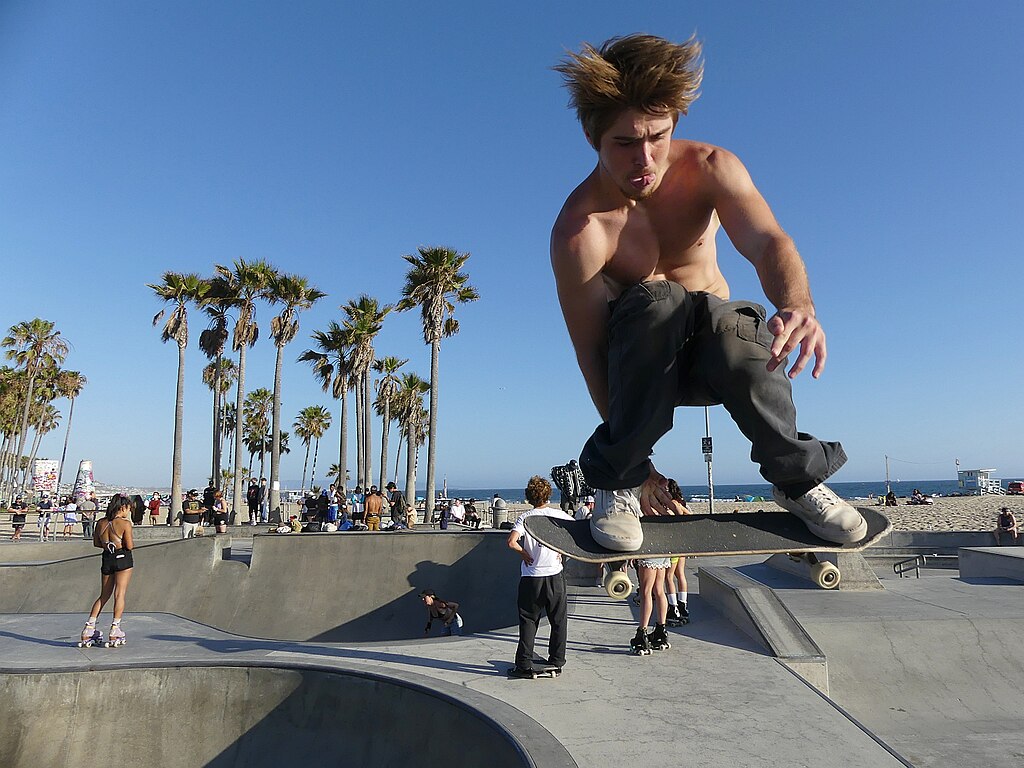Skateboarding officially became an Olympic sport in the 2020 Summer Olympics in Tokyo, so it’s definitely a sport…right? Maybe. Olympic skating exists more along the lines of competitive skateboarding. When you think of skateboarding, you probably think of people out in the streets or at a skatepark with their friends, also known as street skating. How do we decide if it’s a sport or not? A sport is defined as an activity involving physical exertion and skill in which an individual or team competes against others for entertainment. So let’s break that down.
Skating, inarguably, demands physical activity. It can be exhausting and requires considerable effort. Skateboarding requires intense focus and mental engagement. Riders must continuously make split-second decisions, adjust their movements, and adapt to unpredictable surfaces, which demands both physical and mental coordination. However, street skating usually lacks driven competition against anyone else. A friendly game of S.K.A.T.E or a casual bet mark the outer limits of how competitive street skating will get. For many skateboarders, the activity revolves around personal enjoyment, self-expression, and creativity rather than competition. So do we call it a sport?
This debate has raged for years within the skateboarding community. Some would say it must be a sport due to its physical nature. Many would say otherwise, such as the skateboarders drawn to skating because of the freedom in rules compared to other sports. Each skater has the ability to creat their own unique style. Basketball, soccer, football, and other popular sports have a set list of rules that must be followed during the game. These mainstream sports also have a playbook with all the rules and conditions. Skateboarding, by contrast, lacks a unified global governing body that dictates rules and organizes global competitions. This lack of a governing body can make skateboarding feel less ‘official’ than traditional sports. If you said football was a sport, nobody would blink an eye. But when you mention skateboarding, some conflicting opinions may be voiced.
When you attach the label of ‘sport’ to an activity it becomes a competition. There must be a winner, a best athlete. Skateboarding is different—it’s a canvas for personal style. Take a flat-ground kickflip: three different skaters could do it and have it look completely different each time, as each skater brings their own approach. A skater’s style can even become part of their appeal, and often serves as a marker of skill. More than anything, determining the “better” skater comes down to taste. Skateboarders view their passion as more of a lifestyle or subculture than a sport. Many skateboarders embrace it for personal expression, freedom, and creativity, rather than strictly focusing on competition or physical achievement. But does the lack of a clear winner mean skateboarding isn’t a sport? People can play recreational soccer and it would still be considered a sport. In a recreational soccer match, the lack of real competition means no real winner. But we still have two teams playing against each other, so in theory one will win. There comes a point where skating switches from a hobby to a sport – when a point system is introduced.
In skate competitions, judges evaluate skaters based on several important factors. They look at the technical difficulty and complexity of the tricks, as well as how well they’re executed. Precision, style, and control are key elements, and judges also appreciate variety—skaters who mix up their tricks across different obstacles like rails and ramps tend to score higher. The overall flow of the run matters too, as judges consider how smoothly the skater transitions between tricks and how they engage with the audience. Consistency also counts; landing tricks cleanly throughout the run is crucial. After the performance, each judge assigns a score, and the scores are averaged to determine the final ranking. This system pivots leisure skating into a competition.
Skateboarding requires a combination of agility, strength, coordination, and significant skill. Watching a video of someone executing a seemingly simple trick may lead you to think, “that looks easy; I could do that on my first try”. However, in reality such feats require much more engagement. Success in skateboarding demands a high level of commitment and determination. When attempting a new trick, it is rare to not succeed on the first 50 tries. Even if you can land a trick once, you need to put in consistent effort to refine and maintain that skill.
So, is skateboarding a legitimate sport? The answer isn’t clear-cut. While it definitely involves physical exertion, skill, and competition in certain settings, skateboarding is also deeply rooted in personal expression and creativity, which sets it apart from traditional sports. For some, the lack of rigid rules and a governing body makes it feel less “official.” However, as we see with Olympic skateboarding and competitive events, when scoring systems and competitions are introduced, skateboarding functions much like any other sport.
Ultimately, whether you consider skateboarding a sport might depend on how you define “sport” itself. Is it about competition, or is it about the physical and mental effort involved? The debate is likely to continue, but one thing is certain: skateboarding has carved out a unique space where both sport and self-expression coexist, which makes it unique.


Leave a Reply